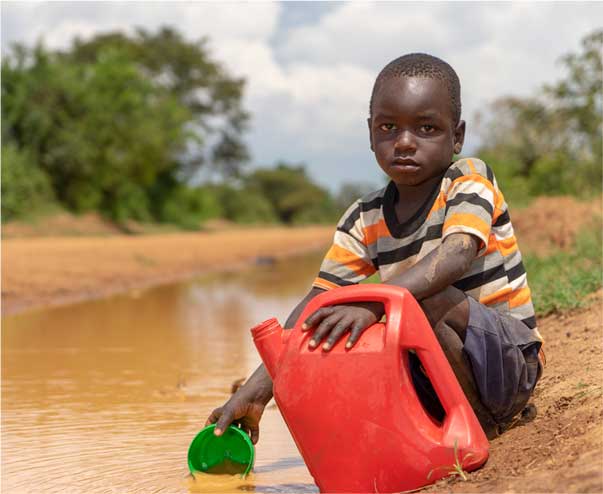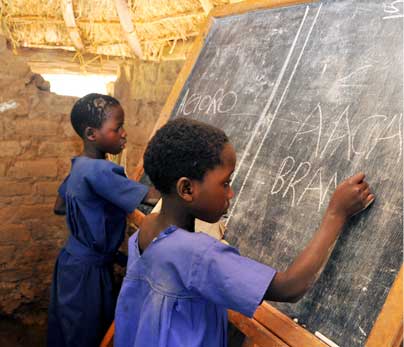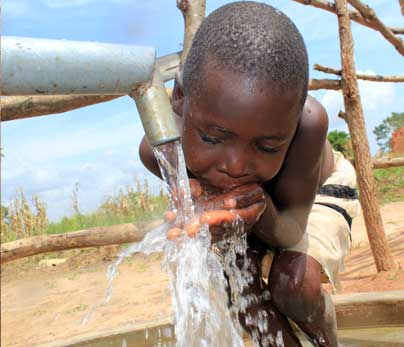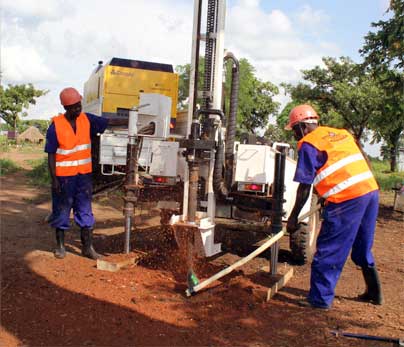
WATER SCARCITY IN THE WORLD

- How Much Water is there in the World?
Water covers about 71 percent of the Earth. 96.5 percent of that is ocean water. - How Much of the Water in the World is Drinkable?
2.5 percent of all the water on the planet is freshwater that is drinkable. - How Much of the Water in the World is Drinkable Right Now?
Only 1 percent of all freshwater is easily accessible in rivers, lakes and streams. The rest of it is stuck in glaciers and snowfields. - How Many People in the World Have Access to Clean Water?
Out of around 7.8 billion people in the world, only about 6 billion of them have access to clean water. - How Many People in the World Do Not Have Access to Clean Water?
785 million people in the world lack access to clean water. That is 1 person without safe water out of every 10 people with it. - How Many People in sub-Saharan Africa Do Not Have Access to Clean Water?
Only about half of the population in sub-Saharan Africa has access to clean water! And 37% of the world’s total of 785 Million people without clean water live in sub-Saharan Africa.
WATER & HEALTH
- How Does a Lack of Safe Drinking Water Affect People’s Health? Over 80% of the disease in developing countries is related to poor drinking water and sanitation.
- How Many Children Die Every Day Because of Drinking Unsafe Water? 4,500 children die every day from preventable diseases related to a lack of access to clean water, adequate sanitation and hygiene.
- How Else Does Carrying Water Affect People’s Health? Medical research has reported many cases of lasting damage to women’s health in consequence to carrying heavy jugs of water, like chronic fatigue, spinal and pelvic disfigurements, and effects on reproductive health such as spontaneous miscarriages.
- How Does Providing Clean Water Solve Health Issues? If the world did nothing besides just providing access to clean water, without any other medical involvement, we could save 2 million lives per year.

FINANCIAL IMPACT OF WATER

- How Does Dirty Water Affect People’s Living Situations? The number of people living below the poverty level in sub-Saharan Africa is predicted to double to 400 million by 2020 if domestic governments and foreign aid do not take urgent and serious action to provide safe drinking water and proper sanitation systems.
- How Does Dirty Water Affect the Economy? Education is essential for short and long-term economic progress. No country has succeeded in rapid and sustaining economic growth without at least 40% of adults being literate. Not having access to clean water and sanitation systems lowers school attendance rates and increases risk of disease and death, This will also lower that country’s GDP.
- How Does Providing Clean Water Solve Economic Issues? Every 1 dollar spent on adding access to water and sanitation systems generates about 8 more dollars in costs avoided and productivity gained. Studies have shown that crop yields could rise up to 22 percent if women farmers had the same education and inputs, like fertilizer, as men farmers. Furthermore, a person’s salary would increase by 10% for every year of school they take on, which translates to a 1% annual increase in GDP.
WATER AND GENDER
- How Does Dirty Water Affect Women and Children? In Africa, more than a quarter of the population spends more than 30 minutes, sometimes up to 6 hours, walking 3.75 miles just to collect enough water for the day. Women and children are mostly responsible for fetching water and caring for the sick (who primarily fall ill due to unclean water). This means that women and children have less time to spend on productive activities, such as going to school or working on a business venture, whereas men and boys can spend their days getting educated and making money.
- Does the Water Crisis Have a Gender Bias? Not offering girls the same schooling opportunities as boys costs less-developed nations $92 billion every year. That means $1 trillion per decade is missed out on in salaries.
- How Do Water and Sanitation Solutions Help Women and Girls? When girls are given clean water and private toilet facilities at school, they don’t have to walk for miles to fetch water daily and therefore, school enrollment increases by 15%. This means that girls will reach higher levels of education and the benefits this has will reduce diagnoses of HIV/AIDS, will reduce poverty, improve the health of women and their children, delay unlawfully young marriages, decrease female genital cutting, and increase empowerment, confidence, and the ability to choose for oneself.

DIRTY WATER AND GLOBAL POVERTY

- How Do Water and Sanitation Solutions Affect Poverty? “No other single intervention is more likely to have a significant impact on global poverty than the provision of safe water.” – Schuster-Wallace. C.J., Grover, V.I., Adeel, Z. Confalonieri, U. and Elliot, S. Safe Water as the Key to Global Health. (United Nations University, 2008).
- How Does This Affect the Global Economy? “The UN estimates it would cost an additional $30 billion to provide access to safe water to the entire planet. That’s a third of what the world spends in a year on bottled water.”

Drop in the Bucket is drilling wells at schools in sub-Saharan Africa. These wells make it possible for children to go to school and get an education. Education is the most effective way to help move communities out of poverty. By helping us build wells you can help change lives and reduce poverty in Africa. You can help drill a well by clicking this link. Or you can sign up to make a one time or monthly donation.



